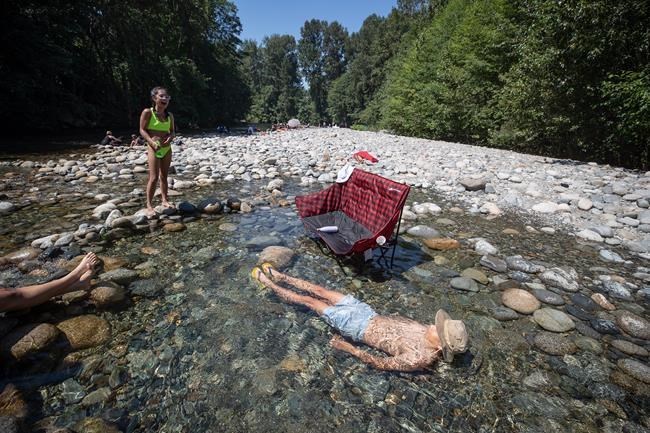VANCOUVER — Environment Canada warns the torrid heat wave that has settled over much of Western Canada won't lift for days, although parts of British Columbia and Yukon could see some relief sooner.
Heat warnings were posted across B.C. and Alberta, large parts of Saskatchewan, the Northwest Territories and a section of Yukon on Monday as the weather office forecasts temperatures reaching 40 C in some areas.
Sixty temperature records fell Sunday in B.C., including in the village of Lytton, where the mercury reached 46.6 C — breaking the all-time Canadian high of 45 C set in Saskatchewan in 1937.
Environment Canada warns the "prolonged, dangerous and historic heat wave" could ease as early as Tuesday on B.C.'s south coast and in Yukon, but won't relent until mid-week, or early next week, elsewhere.
Forecasters said humid conditions could make it feel close to 50 C in B.C.'s Fraser Valley, where area raspberry growers say any cooling by Tuesday may come too late for their heat-ravaged crops. One farm posted on social media that its season is likely over before a single berry has been picked.
More than a dozen school districts in the province cancelled classes Monday rather than hold them in unair-conditioned classrooms. Fraser Health said it is temporarily juggling appointments and relocating several COVID-19 vaccination clinics to reduce the chance of heat-related illnesses.
Mike Danks, team leader of North Shore Rescue, said hikes should be postponed until the temperature lowers considerably.
"My recommendation is that you do something else," he said. "This is not the day to be doing more of an extreme hike in the backcountry because there's very little shelter for you once you're out there, from the sun, and conditions are changing rapidly."
Danks said snow is thawing quickly and that creates unstable conditions.
"I really caution people against doing anything that's more than a light hike, like going down to the rivers to get some cooling," he said.
"Even when conditions are more normal, people need to be very hydrated prior to going on a hike. It's not enough just to bring a couple of litres of water with you on a hike."
Early last week, even before temperatures began to soar, crews rescued someone who passed out on the trails of Mount Hanover, Danks said, adding the person had ventured out without enough food and water. Crews then responded to another call at Crown Mountain, where a hiker had vomited and was unable to move, he said.
"We're seeing temperatures in the upper 30s and into the 40s today, which is extreme. If you factor in the amount of effort that you're going to have to put in to travel in these conditions and temperatures, it's just not worth the risk. And it's going to be the same for our members conducting a rescue."
This report by The Canadian Press was first published June 28, 2021.
The Canadian Press




